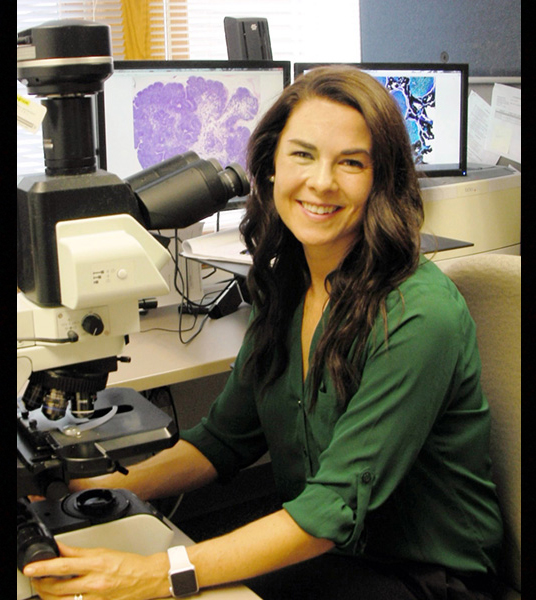
Katherine Gibson-Corley, DVM, PhD, DACVP
What is your hometown?
Cumming, Iowa
How/when did you become interested in science and/or medicine?
I think science has always been a focus in my life. Growing up with parents in the healthcare field, I was surrounded by a passion for science and learning. I was and still am an animal lover so pursuing a career in veterinary medicine was a dream of mine since I was a child.
When did you join the University of Iowa faculty?
2011
How or why did you choose to join the faculty at the University of Iowa?
My position at the University of Iowa is extremely unique. I knew I wanted to work in academia and be able to blend my clinical training as a veterinarian, my specialty training as a veterinary pathologist and my PhD training at the bench. The University of Iowa is one of the only places that had cultivated this type of Comparative Pathology position and I knew this is where I wanted to be.
Is there a teacher or mentor who helped shape your career?
I am fortunate to have had extraordinary mentors throughout my life, both personally and professionally.
Among these, it was my father who first sparked my interest in science and its methods and who helped me choose my career paths. In veterinary medical school it was Dr. Ron Myers whose disciplined scholarship inspired me. At the bench, it was Dr. Doug Jones who pushed me to be an independent thinker in the laboratory. Dr. Amanda Fales-Williams inspired me to mentor other women in science and medicine.
How do you see your faculty role impacting medicine and/or science?
My role as a comparative pathologist allows me to work with both basic scientists and clinical researchers. It has been gratifying to see how some collaborative work in which I’ve been fortunate to participate has been translated from the lab to the bedside. Some studies have led to clinical trials while others have afforded better understanding of diverse mechanisms of a variety of human diseases. I’m lucky to work in so many areas of science and medicine and I'm grateful the University of Iowa affords me opportunity to see how bench research directly impact human medicine.
What is the biggest change you've experienced in your field since you were a student?
Technology! Technology is remarkable--it can be utilized for teaching and learning, allowing for a diversity of learning styles (and therefore greater student success in the classroom and beyond).
What one piece of advice would you give to today's students?
Work hard, pursue your passions and remember to enjoy the journey along the way. Too often we get wrapped up in our professional pursuits and forget to really savor all of the joys in life such as family, friends and hobbies.
In what ways are you engaged in professional activities outside the University (i.e. population based research, mentoring high school students, sharing your leadership/ expertise with organizations or causes, speaking engagement off campus, etc.)?
As a comparative pathologist at a medical research institution I collaboratively use models to better understand how we can diagnose, treat and prevent human diseases. My areas of interest are broad and include neuropathology, ocular pathology, female reproductive tract pathology as well as pulmonary and pancreatic pathology. I am currently engaged in research focusing on Cystic Fibrosis, preeclampsia, blindness, and many types of malignancies including head and neck cancer and breast cancer.
What are some of your outside (personal) interests?
I have two little boys so a primary interest of mine is coming up with new ways to wear them out. I love spending time with family, and I’m currently trying to cultivate a green thumb. Finally, I’m into all types of fitness, so you will likely see me at the Field House or CRWC when I have a free moment or need some stress relief.